Transforming our future: the UK's space sector
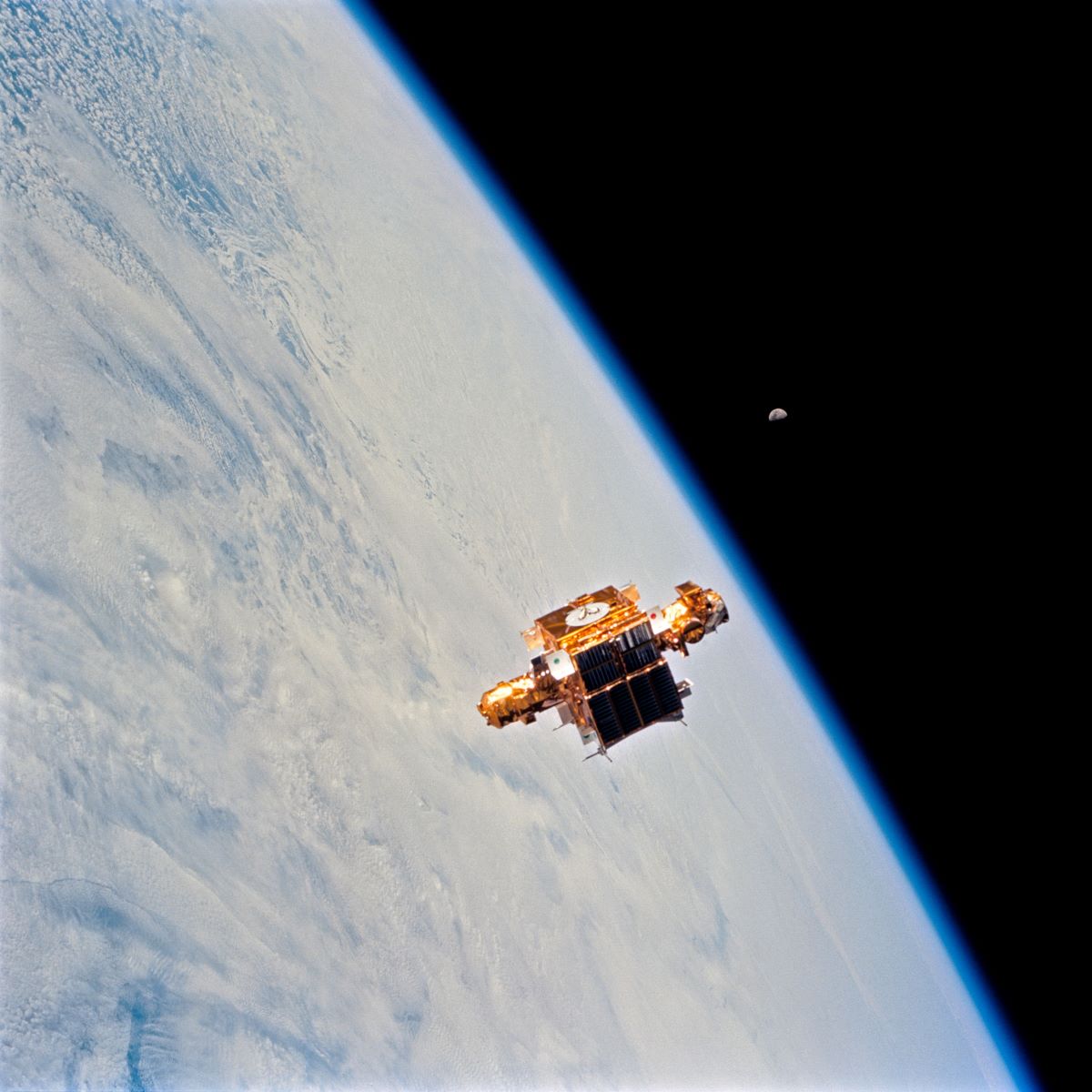
On 3 June 2025, the Royal Society held a conference addressing the future of the UK's role in the space sector.
The UK space sector is becoming ever more integrated into everyday life, playing a crucial role across various industries while also driving and advancing innovation. As the sector continues to evolve, it is vital to foster greater collaboration within and thereby achieve even greater potential and impact.
This one-day conference convened industry, academia, policy, space specialists and non-specialists to examine the applications of space to other sectors, showcase emerging technologies, and provide a picture of the global space scene and the UK’s part in it.
Transforming our future conferences
This conference forms part of the Royal Society's industry-focused 'Transforming our future' series. These unique meetings feature cutting-edge science and bring together experts from industry, academia and government to explore and address key scientific and technical challenges of the coming decade.
Download the conference report
The UK's space sector conference report (PDF)
View the conference recording
Watch the full video playlist on the Royal Society YouTube channel.
Organisers
Schedule
Chair
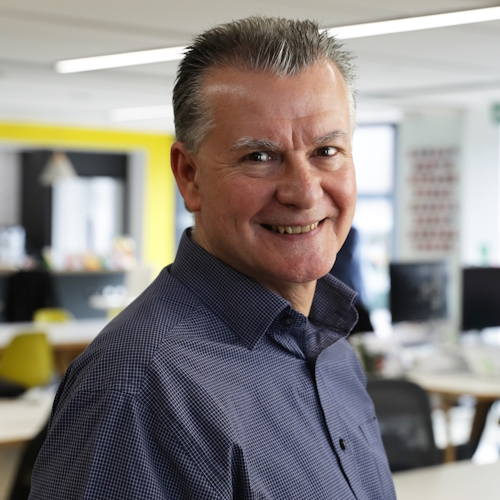
Dr Chris Hobbs
Former EiR, University of Southampton / Formerly Satellite Applications Catapult

Dr Chris Hobbs
Former EiR, University of Southampton / Formerly Satellite Applications Catapult
Chris is an Enterprise Expert at SETsquared Surrey, an incubator supporting spin outs and scale ups from all sectors, including space. He has been a Royal Society Entrepreneur in Residence at the University of Southampton, supporting academics and researchers in Space and Astronomy to commercialise their research work, potentially as spin out companies. As a former Head of Business Strategy at the Satellite Applications Catapult, he helped businesses to grow in the space sector, particularly through incubators and accelerators, and was previously Managing Director of a technology-based business producing portable solid-state hydrogen power sources for the aerospace, drone and automotive markets. He has also worked in two large corporates, QinetiQ and AEA Technology (formerly the UK Atomic Energy Authority).
His skills include leadership, business management, growth and business development, bid, programme, project and product management. He has a PhD in Physics.
| 09:20-09:30 |
Welcome remarks & introduction to keynote
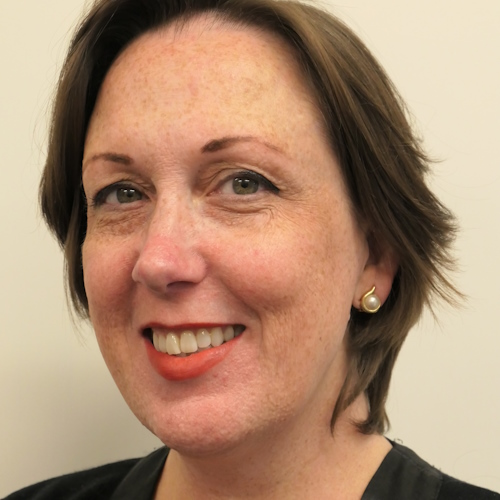
Professor Sheila Rowan CBE FRSUniversity of Glasgow 
Professor Sheila Rowan CBE FRSUniversity of Glasgow Professor Sheila Rowan FRS is the Chair of Natural Philosophy at the University of Glasgow and Physical Secretary and Vice-President of the Royal Society. Since 2009, Professor Rowan has been Director of the Institute for Gravitational Research at the University of Glasgow’s School of Physics and Astronomy. Her research contributed to one of the most significant scientific breakthroughs of this century: the first detection of gravitational waves announced in February 2016. This resulted in a share of the 2016 Special Breakthrough Prize in Fundamental Physics for her and the members of her team in Glasgow. She received the Hoyle Medal and Prize of the IOP in 2016, the Harold Hartley Medal of the Institute of Measurement and Control in 2020 and was made a CBE in 2021. She received the (inaugural) Philip Leverhulme Lifetime Achievement Award in 2023. Sheila served from 2018 - 24 on the Council of the Science and Technology Facilities Council, latterly as its Senior Independent Member and Co-Chair. From 2016 - 21 she was the Chief Scientific Advisor to the Scottish Government, and from 2021 - 23 served as President of the Institute of Physics (IoP). She is currently the Deputy Chair of the Strategic Advisory Board for the UK National Quantum Technology Program. |
|---|---|
| 09:30-10:00 |
The $1.8 trillion question: the global space sector and the challenges facing the UK
While space activities are more and more in the daily news, and the pace of change has reached an unprecedented scale, it is sometimes hard to distinguish reality from hype. What do we mean by the space sector anyway? What discoveries lie ahead? How important is space to every-day life? What is the UK doing today compared with our competitors and partners? And are we organised to succeed? Drawing on thirty-five years’ experience in industry, the Research Councils, the UK Space Agency and the international space community, David Parker will attempt to draw lessons from the past and present, as a stimulus for looking fifty years ahead. 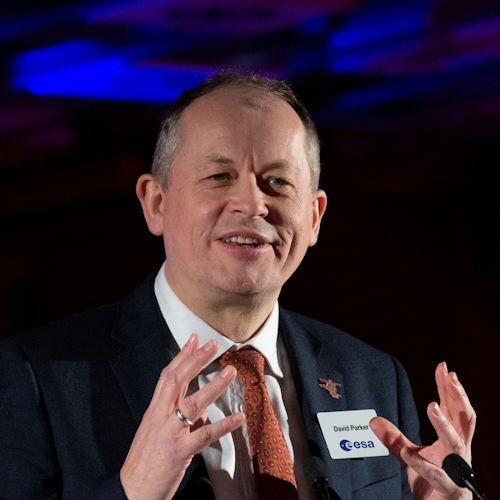
Professor David ParkerUniversity of Southampton 
Professor David ParkerUniversity of Southampton Over a thirty-five career, David Parker has become one of the UK’s leading space programme experts. Following engineering roles in industry studying new astrophysics and planetary missions, he later secured UK leadership for projects such as Aeolus and LISA Pathfinder. Joining the Research Councils in 2004 to represent the UK in ESA’s science and exploration programmes, he helped create the UK Space Agency in 2010, becoming its Chief Executive in 2013. As a Director of ESA (2016-23), he established its space exploration programme and doubled its budget. Now a visiting Professor at the University of Southampton, he consults for ESA and is a non-executive member of the UK Space Agency’s Board. Holding a BSc in Aeronautics and Astronautics and a PhD sponsored by NASA, in 2019 he received the Royal Aeronautical Society’s Geoffrey Pardoe award for long and valued service to the space sector. |
Chair
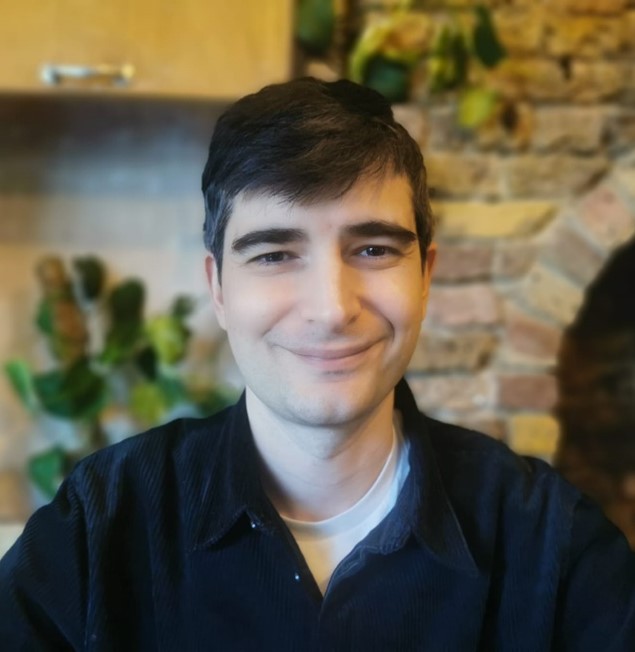
Louis Barson
Institute of Physics

Louis Barson
Institute of Physics
Louis leads the Science and Innovation, Education and Programme functions for the IOP, bringing an international background, with experience of emerging technologies and business innovation strategy. He is also executive lead for the Ecosystem Programme.
| 10:00-10:05 |
Introduction to Session 1

Louis BarsonInstitute of Physics 
Louis BarsonInstitute of Physics Louis leads the Science and Innovation, Education and Programme functions for the IOP, bringing an international background, with experience of emerging technologies and business innovation strategy. He is also executive lead for the Ecosystem Programme. |
|---|---|
| 10:05-10:20 |
The value of space applications to a range of sectors: Overview
In 2010, the UK published its groundbreaking Space Innovation and Growth Strategy. This was the first (and only) time that UK government, industry and academia got together to produce a comprehensive vision for the UK space sector. It was bold in its outlook. It discussed how great value lay in the applications and services that space technology was increasingly enabling on Earth. It described the emerging “NewSpace” economy, and how this would require new sources of capital and new ways of getting technology into space - including the first call for UK launch capability. It talked about new constellations of satellites and how these would transform industries. This was radical thinking in 2010. Now, this is the new reality, and we take it for granted. Approximately 18% of the UK economy is reliant on space technology, with space-based solutions embedded in retail, logistics, health, energy, agriculture, and financial services. We stand on the verge of another new era, where traditional industries (e.g. data centres, manufacturing, biotech, mining, energy) are moving into space. This talk will review the progress that has been made in space applications since 2010 and consider what we can expect to see over the next 15 years. 
Stuart MartinVisiting Professor of Space Applications, Imperial College London 
Stuart MartinVisiting Professor of Space Applications, Imperial College London Stuart Martin is a highly accomplished figure in the UK space industry, best known for his tenure as CEO of the Satellite Applications Catapult from foundation in 2012 until stepping down in 2023. Under his leadership, the Catapult fostered innovation and growth within the space sector, promoting the use of satellite technology for a wide range of applications across many different industries. Stuart’s expertise lies in strategy development and innovation, and he remains active supporting a number of space companies and related public bodies on the board or as an advisor. Current roles include serving as a Board Member at the UK Space Agency, Chair of Trustees at the National Space Centre, Chair of Space Solar Ltd and Non-Exec Director of AAC Clyde Space. Stuart is also Visiting Professor of Space Applications at Imperial College. |
| 10:20-10:35 |
Fundamental physics in space: driving technology for onward applications
Space missions cover a remarkable breadth of science and drive innovation in technology and precision engineering. Silicate bonding technology, originally developed for NASA’s Gravity Probe B (GP-B) mission where it was used to fabricate ultra-stable and low-distortion optical assemblies in a cryogenic space environment, has since become a critical enabler in the field of gravitational wave detection. Although originally designed to enable space-based relativity experiments, some of GP-B's technological advancements found impactful applications beyond their initial scope. This presentation explores how a core innovation from GP-B was adapted and adopted into instrumentation for the Laser Interferometer Gravitational-Wave Observatory (LIGO) ground-based detector and the Laser Interferometer Space Antenna (LISA) Pathfinder mission. By tracing the evolution of technologies from GP-B to LIGO and onwards to LISA Pathfinder, this talk highlights the synergy between fundamental physics missions and broader applications, emphasising how space instrumentation continues to drive scientific frontiers on Earth and in space. 
Professor Sheila Rowan CBE FRSUniversity of Glasgow 
Professor Sheila Rowan CBE FRSUniversity of Glasgow Professor Sheila Rowan FRS is the Chair of Natural Philosophy at the University of Glasgow and Physical Secretary and Vice-President of the Royal Society. Since 2009, Professor Rowan has been Director of the Institute for Gravitational Research at the University of Glasgow’s School of Physics and Astronomy. Her research contributed to one of the most significant scientific breakthroughs of this century: the first detection of gravitational waves announced in February 2016. This resulted in a share of the 2016 Special Breakthrough Prize in Fundamental Physics for her and the members of her team in Glasgow. She received the Hoyle Medal and Prize of the IOP in 2016, the Harold Hartley Medal of the Institute of Measurement and Control in 2020 and was made a CBE in 2021. She received the (inaugural) Philip Leverhulme Lifetime Achievement Award in 2023. Sheila served from 2018 - 24 on the Council of the Science and Technology Facilities Council, latterly as its Senior Independent Member and Co-Chair. From 2016 - 21 she was the Chief Scientific Advisor to the Scottish Government, and from 2021 - 23 served as President of the Institute of Physics (IoP). She is currently the Deputy Chair of the Strategic Advisory Board for the UK National Quantum Technology Program. |
| 10:35-10:50 |
Satellite Communications: Which lessons from the last 25 years are relevant for the next?
The Satellite communications landscape has changed beyond recognition in the last 25 years. What will the next 25 years bring? There is an ever increasing convergence between the worlds of defence and commercial communications whilst in parallel, the geopolitical global situation is making requirements definers and policy makers think twice about how much reliance to put on unprotected communications. Are the advancements in technology and lower cost access to space helping the conversation or making the situation more cloudy than ever before? This talk will try to prioritise which questions are the most important for the next 25 years and highlight some of the key risks and opportunities. 
Andrew StannilandSatellite Industry Executive 
Andrew StannilandSatellite Industry Executive Andrew was the Chief Executive Officer of Thales Alenia Space in the UK from 2019 to the end of 2024. Prior to Thales Alenia Space, Andrew was Vice President of Market Development and Strategy at Inmarsat where he led a global team in delivering the Global Government Business Unit’s strategy, resulting in growth and diversification of customer revenues and geographical reach. |
| 10:50-11:00 |
Q&A
|
Chair

Dr Chris Hobbs
Former EiR, University of Southampton / Formerly Satellite Applications Catapult

Dr Chris Hobbs
Former EiR, University of Southampton / Formerly Satellite Applications Catapult
Chris is an Enterprise Expert at SETsquared Surrey, an incubator supporting spin outs and scale ups from all sectors, including space. He has been a Royal Society Entrepreneur in Residence at the University of Southampton, supporting academics and researchers in Space and Astronomy to commercialise their research work, potentially as spin out companies. As a former Head of Business Strategy at the Satellite Applications Catapult, he helped businesses to grow in the space sector, particularly through incubators and accelerators, and was previously Managing Director of a technology-based business producing portable solid-state hydrogen power sources for the aerospace, drone and automotive markets. He has also worked in two large corporates, QinetiQ and AEA Technology (formerly the UK Atomic Energy Authority).
His skills include leadership, business management, growth and business development, bid, programme, project and product management. He has a PhD in Physics.
| 11:30-11:35 |
Introduction to Session 2

Dr Chris HobbsFormer EiR, University of Southampton / Formerly Satellite Applications Catapult 
Dr Chris HobbsFormer EiR, University of Southampton / Formerly Satellite Applications Catapult Chris is an Enterprise Expert at SETsquared Surrey, an incubator supporting spin outs and scale ups from all sectors, including space. He has been a Royal Society Entrepreneur in Residence at the University of Southampton, supporting academics and researchers in Space and Astronomy to commercialise their research work, potentially as spin out companies. As a former Head of Business Strategy at the Satellite Applications Catapult, he helped businesses to grow in the space sector, particularly through incubators and accelerators, and was previously Managing Director of a technology-based business producing portable solid-state hydrogen power sources for the aerospace, drone and automotive markets. He has also worked in two large corporates, QinetiQ and AEA Technology (formerly the UK Atomic Energy Authority). His skills include leadership, business management, growth and business development, bid, programme, project and product management. He has a PhD in Physics. |
|---|---|
| 11:35-11:50 |
Knowing the space environment
As we become more dependent on space-based capability and increase investment in space, it’s critical that we understand the operating environment. Space weather isn’t science fiction, it’s science fact. Collectively, we need to be cognisant of the risk space weather presents both to day-to-day operations as well as surviving the ‘big storm’. What are the risks and how can we work together to characterise the risks and understand the potential impacts and consequences? 
Mark GibbsMET Office 
Mark GibbsMET Office I have worked for the Met Office for 38 years as a meteorologist, across a range of roles. Since 2010, I led the development of, and continue to lead, the space weather programme within the Met Office. Met Office owns the space weather risk on the National Risk Register on behalf of the UK Government. Since 2014, Met Office Space Weather Operations Centre (MOSWOC) has delivered forecast services 24/7/365 to UK Government and CNI operators, as one of only two global guidance centres for space weather. I have sat on a number of international committees and working groups including being co-chair of the ESA VIGIL Mission Advisory Group and a member of the US National Academies ‘Planning the future Research and Operations Space Weather Infrastructure’ committee. |
| 11:50-12:05 |
Made in Space, for Earth
Space Forge is an advanced materials space company. We are focused on harnessing the benefits of the space environment to produce new types of semiconductors for use on Earth. Our goal is to be the world’s first truly climate positive space company by producing semiconductors so efficient that despite the environmental burden of accessing space, they prevent more CO2 than they took to create. Our next mission, ForgeStar-1, launches this year. 
Josh WesternSpace Forge 
Josh WesternSpace Forge Josh co-founded Space Forge in 2018. From kick-starting their mission to change the face of the space industry - making space work for humanity - Josh, and co-founder Andrew Bacon, have taken the industry leading startup from a garage in Bristol to raising the largest ever seed round in Europe by a Space Tech company, backed by NATO and the UK Government. Space Forge is developing the world’s first fully reusable platform, to unlock the benefits of space for manufacturing and experimentation at scale. By producing next generation materials off planet and returning to Earth, a step change in humanity’s progress is possible - with the power to progress a clean industrial revolution. Prior to co-founding Space Forge, Josh gained a vast knowledge of the UK Space Industry: working for Thales Alenia Space across marketing and sales, as well as was being seconded to the UK Space Agency, where he worked on everything from Critical National Infrastructure to technology harmonisation with European Space Agency member states. |
| 12:05-12:20 |
Clearing the Path for the Future
Sixty years of space exploration has brought incredible advancements to Earth. Our current space infrastructure provides us with vital satellite services every moment of every day. But it has also resulted in huge quantities of debris. With over 14,000 satellites now orbiting Earth, 2,850 of them no longer functioning and unable to manoeuvre, the risk to operational satellites and future missions is growing rapidly. Astroscale is on a mission to tackle this growing threat and drive the secure and sustainable development of a circular economy in space. Through proven rendezvous and proximity operations (RPO) and advanced capture technology, Astroscale has begun to inspect and ultimately remove large debris from orbit, paving the way to a safer and more sustainable future in space. 
Sharon Parker-LinesAstroscale 
Sharon Parker-LinesAstroscale Sharon joined Astroscale Ltd. in September 2020 to support the development of the Astroscale business in the UK and Europe. She is a senior leader with extensive experience and a strong reputation built up over 30 years. As Director for Government & Regulatory Affairs, Sharon leads on the company’s interaction with all levels of Westminster and relevant Government agencies as part of Astroscale’s commitment to getting licensing and regulation in place that will foster a sustainable space environment and market. Sharon’s experience includes general management, strategic business development, driving companies from start up, through high growth and commercial development, senior customer account management, and business operations. Her experience also includes operational leadership for an international team of 500 staff. Sharon regularly represents Astroscale and the in-orbit servicing industry in panel discussions on the value of a sustainable space environment and what we need to do to get there. |
| 12:20-12:35 |
Innovation in the space sector – enabling innovation through novel insurance and regulatory approaches and sustainable practices
The space industry and technology are changing rapidly. Novel insurance models, regulatory approaches and the use of sustainable practices, and the incentivisation of them, can enable valuable emerging technologies. Such approaches can ensure a better insurance risk; allow access to finance; support better verified data and permit clarity for licensing purposes. This presentation looks at novel models to insure, finance and licence emerging technologies effectively, while meeting international obligations and incentivising sustainable practices. 
Professor Joanne Wheeler MBEAlden Legal / Earth & Space Sustainability Initiative 
Professor Joanne Wheeler MBEAlden Legal / Earth & Space Sustainability Initiative Joanne is a leading international expert in the field of satellite and space law, policy, regulation, spectrum issues and commercial contracts, having worked at Ofcom, ESA, and for over 25 years in private legal practice in this area. She was awarded an MBE for services to the UK space industry, won the Financial Times European Legal Innovator of the Year award and is ranked Tier 1 in legal directories. She is the Director of the Earth & Space Sustainability Initiative (ESSI), Chair of the Satellite Finance Network (SFN) and the Prospero Space Fellowship. She is a Fellow of the Royal Astronomical Society, the Royal Aeronautical Society and Deputy Chair of the National Space Centre. She was appointed as an honorary Professor by the University of Leicester. |
| 12:35-12:50 |
The intersection between the space and non-space industries and opportunity for mutual benefit
As the UK positions itself as a global leader in both civil nuclear and space technologies, the intersection of these two sectors presents unique opportunities for innovation and strategic advantage. This talk explores how the nuclear industry can play a pivotal role in supporting the UK’s space capability – ranging from compact power generation systems for lunar and Martian habitats to radioisotope thermoelectric generators (RTGs) and nuclear propulsion systems that can dramatically shorten interplanetary travel times. Equally, advancements in space technologies such as robotics, remote monitoring and materials science can be leveraged to enhance nuclear operations on Earth, including decommissioning, waste management, and safety systems. Drawing on real-word case studies and emerging collaborative programmes, the session will highlight the mutual benefits of cross-sector engagement and the need for targeted investment, regulatory alignment, and skills development. The presentation will also outline a vision for how an integrated nuclear-space strategy could support the UK’s net zero goals, drive economic growth, and strengthen national resilience in the face of global technological competition. 
Katharine JarmanRolls-Royce 
Katharine JarmanRolls-Royce Katie is the Assistant Chief Engineer for Space, running the Rolls-Royce Novel Nuclear Space Micro-Reactor programmes. During her ten years in Rolls-Royce Submarines she has specialised in nuclear Thermal Hydraulics, supporting performance assessments, core manufacturing and providing validation, rig testing and safety case support on a variety of programmes and nuclear plant designs. Throughout her time at Rolls-Royce, Katie has continued to run the Rolls-Royce maths tutoring scheme which she set up in 2016. The scheme sends over 90 volunteers a year from across Rolls-Royce into local Derby schools to support young people from more challenging backgrounds with their maths on a 1:1 basis. Not only is this the largest privately run STEM outreach programme in the UK but it is a great opportunity to inspire local students with what we are doing in Space nuclear and raise their confidence and ability to contribute. |
| 12:50-13:00 |
Q&A
|
| 13:00-13:15 |
House of Lords special inquiry into the UK's engagement with Space

Baroness Catherine AshtonChair House of Lords Inquiry into UK Space Engagement 
Baroness Catherine AshtonChair House of Lords Inquiry into UK Space Engagement Baroness Catherine Ashton served as the European Union's first High Representative for Foreign Affairs and Security Policy between 2009 and 2014. On behalf of the UN Security Council, she coordinated negotiations that resulted in the nuclear programme agreement with Iran. She mediated the Brussels agreement between Serbia and Kosovo for which she was nominated for the Nobel Peace Prize. Previously she was EU Commissioner for Trade, served as a Minister in the Departments of Education and Justice, and was Leader of the House of Lords and President of HM Queen's Privy Council. Baroness Ashton is author of the book 'And then What?' She has received many awards, most recently the Order of the Garter, bestowed by HM King in June 2023. She is a member of the House of Lords Europe Committee and chairs the current inquiry into UK Engagement with Space. |
|---|
| 14:00-14:30 |
Space in 2075: Implications for government and society
The pace of activity in space has accelerated dramatically over the last five years. More satellites were launched since 2020 than the total of all satellites launched between 1957 to 2020 combined. This trend is set to continue, with other emerging and enabling technologies expanding the scope of what is possible in space with significant implications for security, industry, science and the environment. Human presence is anticipated on the Moon in the coming decades with nations set to complete for the best sites. Existing legislation will not cover the range of activities anticipated over the next 50 years. The Royal Society’s Space: 2075 project convened a panel of experts in different fields to consider how space activity might develop. The resulting report prompts policymakers to think carefully about how humanity might prepare for a range of possible outcomes so that space can be used safely and sustainably in the future. 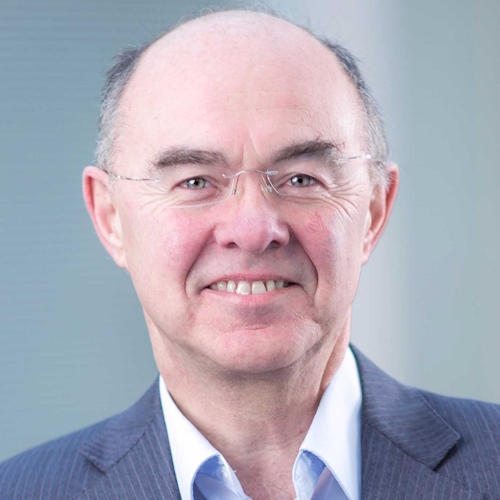
Sir Martin Sweeting OBE FREng FRSUniversity of Surrey Space Centre & Surrey Satellite Technology Ltd 
Sir Martin Sweeting OBE FREng FRSUniversity of Surrey Space Centre & Surrey Satellite Technology Ltd Starting in 1979, Professor Sir Martin Sweeting pioneered rapid-response, low-cost and highly capable small satellites utilizing modern consumer microelectronics to change the economics of space and is widely regarded internationally as the ‘father of small satellites ’that has since led to ‘NewSpace’. In 1985, he founded a spin-off University company (SSTL) that has designed, built, launched and operated in orbit 75 small satellites for communications, Earth observation, space science and space debris removal techniques – as well as 34 navigation payloads for the European Galileo constellation. SSTL has grown to ~400 staff with over £1.5bn in UK export earnings from some 25 international customers. He is a distinguished professor at the University of Surrey Space Centre where he has supervised over 200 PhD students and has over 350 publications.Sir Martin was knighted by HM the Late Queen in 2006. He is a Fellow of the Royal Society, the Royal Academy of Engineering, and the Institute of Physics. |
|---|
Chair

Professor David Parker
University of Southampton

Professor David Parker
University of Southampton
Over a thirty-five career, David Parker has become one of the UK’s leading space programme experts. Following engineering roles in industry studying new astrophysics and planetary missions, he later secured UK leadership for projects such as Aeolus and LISA Pathfinder. Joining the Research Councils in 2004 to represent the UK in ESA’s science and exploration programmes, he helped create the UK Space Agency in 2010, becoming its Chief Executive in 2013. As a Director of ESA (2016-23), he established its space exploration programme and doubled its budget. Now a visiting Professor at the University of Southampton, he consults for ESA and is a non-executive member of the UK Space Agency’s Board. Holding a BSc in Aeronautics and Astronautics and a PhD sponsored by NASA, in 2019 he received the Royal Aeronautical Society’s Geoffrey Pardoe award for long and valued service to the space sector.
| 14:30-15:00 |
International outlook: Collaborate, coexist or compete in a changing global order

Professor Gillian Wright CBE FRSESTFC, UK Astronomy Technology Centre 
Professor Gillian Wright CBE FRSESTFC, UK Astronomy Technology Centre Professor Gillian Wright CBE FRSE is a senior scientist at the UK Astronomy Technology Centre in Edinburgh and a visiting professor of the Institute for Astronomy, University of Edinburgh. She is a graduate of the University of Glasgow and obtained her PhD in physics from Imperial College. Professor Wright is European Principal Investigator of the Mid-Infrared Instrument (MIRI) on JWST, leading a European consortium that developed the instrument in partnership with JPL and the University of Arizona. Professor Wright was Director of the UK Astronomy Technology Centre from 2012 to 2024, and in this role she led the organization in programmes of instrumentation and technology development for astronomy missions and international observatories and a portfolio of projects that apply the techniques to other areas such as environmental monitoring and health. Alongside her research work, she is a strong supporter of public engagement in astronomy. 
Tomas HrozenskyEuropean Space Policy Institute 
Tomas HrozenskyEuropean Space Policy Institute Tomas Hrozensky is a Senior Researcher and Lead on European Engagement at ESPI and is a part of ESPI’s management team. He holds MA and PhD in international affairs from the Matej Bel University in Banska Bystrica, Slovakia. Tomas joined ESPI after previous roles in academia, NGO and government sectors. His experience includes being a Fulbright Scholar at the Space Policy Institute of the George Washington University, a researcher for the Space Security Index, chair of the Slovak Space Policy Association NGO, and member of Slovak delegation to the UN COPUOS. |
|---|
Chair
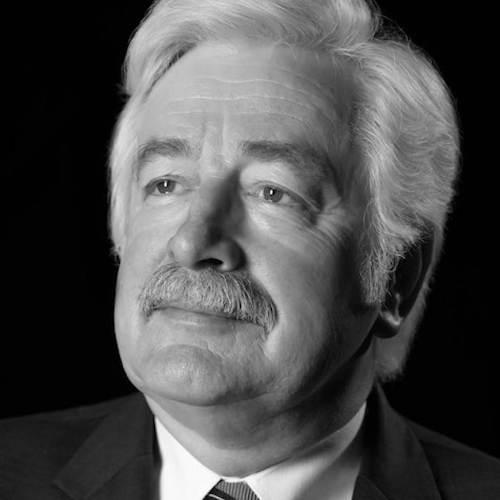
Professor David Southwood CBE
Imperial College University

Professor David Southwood CBE
Imperial College University
David Southwood joined the faculty at Imperial College in 1971, and founded the Space and Atmospheric Physics group there in 1984. The group specialised in space science theory, space magnetometry, climate and atmospheric physics. He became Head of Physics in 1994. In 1997 he joined ESA, becoming Head of Earth Observation (EO) Strategy, introducing a programme of focused ESA EO science missions and operational spacecraft (for EU Copernicus, EUMETSAT and others) still in place today. In 2001, he became Science Director at ESA (responsible for building and operating multiple ESA spacecraft and space telescopes). Retiring in 2011, he became a member then Chair of UK Space Agency Steering Board. He remains today an advisor to the UK ESA Council delegation, Senior Research investigator at Imperial College and Chair of London Institute of Space Policy and Law.
| 15:30-17:10 |
Getting the best return for the UK. How to facilitate a more joined up space sector?

Dr Paul BateUK Space Agency 
Dr Paul BateUK Space Agency Paul Bate has been CEO of the UK Space Agency since September 2021. He leads a team of more than 300 who provide the R&D funding to use space to increase prosperity across the world, protect the planet, and to understand the universe. Prior to space, Paul ran global sales at Babylon Health, which floated on the New York Stock Exchange in 2021, and built a consultancy business. Paul was David Cameron’s senior health adviser in Downing Street and led on health targets and finances in Tony Blair’s Delivery Unit. Paul holds a PhD in Particle Physics. 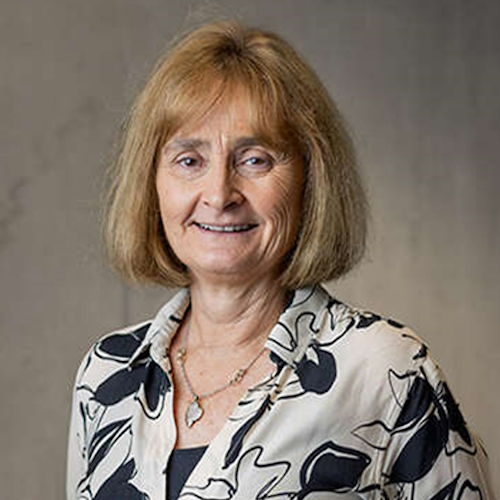
Professor Michele Dougherty CBE FRSScience and Technology Facilities Council 
Professor Michele Dougherty CBE FRSScience and Technology Facilities Council Professor Michele Dougherty CBE FRS FRAS is Executive Chair, Science and Technology Facilities Council (STFC) which is part of UK Research and Innovation (UKRI). Michele is a Fellow of the Royal Society and a Professor of Space Physics at Imperial College. She led unmanned exploratory missions to Saturn and Jupiter, was Principal Investigator of the magnetometer instrument onboard the Cassini mission to Saturn and is Principal Investigator of the magnetometer for the European Space Agency's JUpiter ICy moons Explorer (JUICE) that launched in April 2023. In addition to being awarded the Royal Astronomical Society Geophysics Gold medal, and a CBE in the New Year’s Honours List, Michele was also awarded the Institute of Physics Richard Glazebrook Gold Medal and Prize. She is President-Elect of the Institute of Physics and will formally take up the role of President in autumn 2025. 
Professor Kate Robson BrownUniversity College Dublin 
Professor Kate Robson BrownUniversity College Dublin Professor Kate Robson Brown is Vice-President for Research, Innovation and Impact, at University College Dublin, Ireland. In this role she leads both UCDResearch (discovery and applied research) and NovaUCD (enterprise and commercial activities). She is Professor of Engineering Mathematics and Biological Anthropology. She is a member of the Ireland National Advisory Forum for Space Research, Honorary Fellow of the Alan Turing Institute for Data Science and AI, President of the European Low Gravity Research Association, ESA Human and Robotic Exploration Directorate advisor, co-chair of the UK Space Academic Network, and a Visiting Professor in Data Science at Strathmore University in Nairobi. She is a Trustee of the Natural History Museum. Her research explores the computational modelling of the microstructure of living tissues and manufactured materials and their response to changing and extreme environments, including space. She has a collaborative ESA and UKSA funded experiment currently in orbit on the ISS. 
Elizabeth SewardSpace and Defence Strategic Advisor 
Elizabeth SewardSpace and Defence Strategic Advisor Elizabeth Seward joined BAE Systems in 2022 and is Head of Space Strategy and Market Development, responsible for defining the strategic direction and market growth across defence and civil space. Elizabeth has over 20 years’ experience in the space sector. She was Senior Space Strategist at Airbus Defence and Space where roles included business development, marketing and communications, thermal engineering and future programmes design. Elizabeth was a founding member of the Women in Aerospace Europe UK local group. She is active in the International Astronautical Federation, sitting on several committees, and is a STEM outreach ambassador. 
James CemmellOpen Cosmos 
James CemmellOpen Cosmos James Cemmell is Vice President, Institutional Partnerships at Open Cosmos, one of Europe's fastest growing space businesses. With nearly 20 years' experience in the space sector, he has held leadership roles at the nexus of value creation and public policy. James has an MBA from the University of Cambridge, Downing College and is a fellow of the Royal Aeronautical Society, interested in space strategy and leveraging space for public benefit. |
|---|
Chair

Professor Michele Dougherty CBE FRS
Science and Technology Facilities Council

Professor Michele Dougherty CBE FRS
Science and Technology Facilities Council
Professor Michele Dougherty CBE FRS FRAS is Executive Chair, Science and Technology Facilities Council (STFC) which is part of UK Research and Innovation (UKRI).
Michele is a Fellow of the Royal Society and a Professor of Space Physics at Imperial College. She led unmanned exploratory missions to Saturn and Jupiter, was Principal Investigator of the magnetometer instrument onboard the Cassini mission to Saturn and is Principal Investigator of the magnetometer for the European Space Agency's JUpiter ICy moons Explorer (JUICE) that launched in April 2023.
In addition to being awarded the Royal Astronomical Society Geophysics Gold medal, and a CBE in the New Year’s Honours List, Michele was also awarded the Institute of Physics Richard Glazebrook Gold Medal and Prize. She is President-Elect of the Institute of Physics and will formally take up the role of President in autumn 2025.

